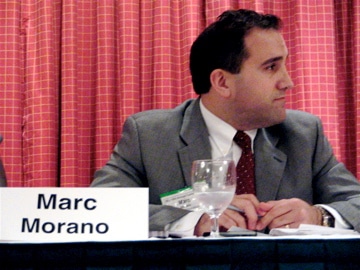The latest list of “650 International Scientists (who) Dissent Over Man-Made Global Warming” seems to be more of the same: dead guys (Fred Seitz, Marcel Leroux, Reid Bryson …), paid deniers (Fred Singer, Tim Ball, Sallie Baliunas …), and a much larger group of weather forecasters and “experts” from unrelated fields, many of whom (eg., Edward Wegman) don’t even disagree with the scientific consensus that human activity is causing climate change.
The apparent author of this list, Swiftboater Marc Morano, even included the names of Ted Nordhaus and Michael Shellenberger, an historian and an anthropologist who have made themselves famous by advocating for renewed and more vigorous policy action against the threat of climate change.
It’s possible that some of the people included in this list sincerely doubt that human activity is promoting potentially catastrophic climate change. For example, the 79-year-old Nobel laureate (Physics, 1973) Ivar Giaever may, legitimately, have fallen behind in his reading. For that matter, it’s possible, perhaps evening likely, that Giaever has never taken any direct interest in atmospheric science.
Still, Morano deserves some credit for guile in the way he presented this list: The short sheet he passed out at the UN Framework Convention on Climate Change in Poland last month didn’t include a single name that was recognizable as being among the “usual suspects” – the deniers for hire with whom Morano and his ex-boss, the Republican Senator for Oil and Gas James Inhofe, generally spend their time.
But if you look past the first dozen or so anonymous quibblers, you soon get to experts like James Peden, a web designer who still advertises himself as an “atmospheric physicist” regardless that he has long since abandoned the field. Peden can no more call himself a scientist than I can claim to be a big city newspaper reporter (last newspaper reporting job, 1980) or, for that matter, an expert practitioner of high-pressure water blasting (Algoma Steel, 1975).
The question we keep asking is this: if Morano and company truly believe that they have science on their side, why continue to consort with people like Fred Singer, who has taken money in his colorful career to deny everything from the health effects of smoking (Philip Morris) to the truth of global warming (Exxon Mobil)?
One answer is that Fred Singer’s Science and Environmental Policy Project is listed as principal sponsor of this most recent disinformation flyer.
There is an old adage that if you tell a lie often enough, people will start to regard it as the truth. But an old lie is still a lie. And people who are careless (or crafty) enough to hang around with old liars deserve to have their own credibility judged accordingly.
Subscribe to our newsletter
Stay up to date with DeSmog news and alerts







